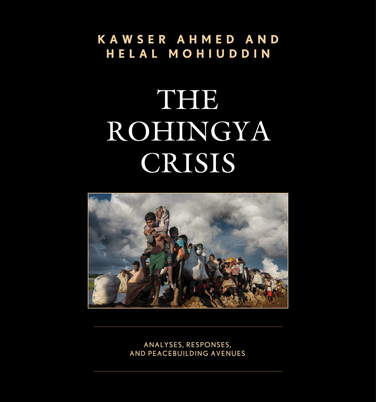[vc_row css=”.vc_custom_1592075566391{margin-top: px !important;}”][vc_column][nd_options_text nd_options_text_tag=”h1″ nd_options_text_align=”center” nd_options_text=”CRRIC WILL LAUNCH THE BOOK ON ROHINGYA CRISIS AT-2020″][vc_separator css=”.vc_custom_1592075228665{padding-top: 15px !important;}”][/vc_column][/vc_row][vc_row css=”.vc_custom_1592075583248{margin-top: 5px !important;}”][vc_column][nd_options_text nd_options_text_tag=”h3″ nd_options_text_weight=”bold” nd_options_text_family=”nd_options_first_font” nd_options_text=”BOOK EXCERPT” nd_options_text_color=”#727475″ nd_options_text_font_size=”20″ nd_options_text_line_height=”20″][nd_options_spacer nd_options_height=”20″][vc_column_text]
Myanmar’s security forces have conducted clearance operations in the Rakhine State since August 2017, driving a mass exodus of ethnic Rohingyas to neighboring Bangladesh. In The Rohingya Crisis: Analyses, Responses, and Peacebuilding Avenues, Kawser Ahmed and Helal Mohiuddin address core questions about the conflict and its global and regional significance. Ahmed and Mohiuddin identify the defining characteristics of Rohingya identity, analyze the conflict, depict the geo-economic and geo-political factors contributing to the conflict, and outline peacebuilding avenues available for conflict transformation at the macro-, meso-, and micro-level. This book is recommended for students and scholars of anthropology, sociology, peace and conflict studies, political science, and Asian studies.
[/vc_column_text][nd_options_spacer nd_options_height=”20″][nd_options_text nd_options_text_tag=”h3″ nd_options_text_weight=”bold” nd_options_text_family=”nd_options_first_font” nd_options_text=”COMMENTS FROM THE REVIEWERS” nd_options_text_color=”#727475″ nd_options_text_font_size=”20″ nd_options_text_line_height=”20″][nd_options_spacer nd_options_height=”20″][vc_column_text]
[/vc_column_text][/vc_column][/vc_row]



